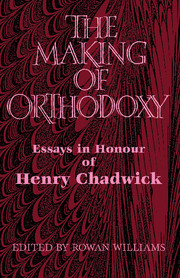Book contents
- Frontmatter
- Contents
- Preface
- List of abbreviations
- Bibliography of Henry Chadwick
- Does it make sense to speak of pre-Nicene orthodoxy?
- ‘And I have other sheep’ – John 10:16
- Reason and the rule of faith in the second century ad
- Adam in Origen
- Panegyric, history and hagiography in Eusebius' Life of Constantine
- Matthew 28:19, Eusebius, and the lex orandi
- The achievement of orthodoxy in the fourth century ad
- Eunomius: hair-splitting dialectician or defender of the accessibility of salvation?
- Some sources used in the De Trinitate ascribed to Didymus the Blind
- The rhetorical schools and their influence on patristic exegesis
- Pelagianism in the East
- The legacy of Pelagius: orthodoxy, heresy and conciliation
- Augustine and millenarianism
- Divine simplicity as a problem for orthodoxy
- The origins of monasticism
- Artistic idiom and doctrinal development
- Index of modern names
- Index of ancient and medieval names
- Index of sources
Some sources used in the De Trinitate ascribed to Didymus the Blind
Published online by Cambridge University Press: 08 October 2009
- Frontmatter
- Contents
- Preface
- List of abbreviations
- Bibliography of Henry Chadwick
- Does it make sense to speak of pre-Nicene orthodoxy?
- ‘And I have other sheep’ – John 10:16
- Reason and the rule of faith in the second century ad
- Adam in Origen
- Panegyric, history and hagiography in Eusebius' Life of Constantine
- Matthew 28:19, Eusebius, and the lex orandi
- The achievement of orthodoxy in the fourth century ad
- Eunomius: hair-splitting dialectician or defender of the accessibility of salvation?
- Some sources used in the De Trinitate ascribed to Didymus the Blind
- The rhetorical schools and their influence on patristic exegesis
- Pelagianism in the East
- The legacy of Pelagius: orthodoxy, heresy and conciliation
- Augustine and millenarianism
- Divine simplicity as a problem for orthodoxy
- The origins of monasticism
- Artistic idiom and doctrinal development
- Index of modern names
- Index of ancient and medieval names
- Index of sources
Summary
For some two hundred years following its mid-eighteenth-century discovery by Mingarelli in a manuscript lacking title page and the opening chapters, the De Trinitate was regarded as the chief surviving work of Didymus the Blind (313–98), the last really distinguished leader of the catechetical school in Alexandria. Mingarelli based his ascription in part on the numerous and striking verbal parallels between this work and Didymus' De Spiritu Sancto, which survives only in Jerome's Latin translation. The last generation, however, has seen a remarkable shift in scholarly opinion on the matter: the discovery of the Toura papyri in 1941 and the ascription to Didymus of a series of extensive biblical commentaries contained in them has led in turn to comparisons of these works with the De Trinitate which seemed to support the conclusion that Didymus could not also have been the author of the latter. If correct, this conclusion not only requires a radical revision of the entire picture of Didymus and his theological teaching developed before the discovery of the Toura papyri; it also leaves the De Trinitate – a major work by any standards – floating in the void of anonymity. In recent years, study of Didymus has concentrated on the Toura commentaries; the De Trinitate has received relatively scant attention, though it is arguably more theologically substantial and significant than the commentaries, whether or not Didymus is the author.
- Type
- Chapter
- Information
- The Making of OrthodoxyEssays in Honour of Henry Chadwick, pp. 173 - 181Publisher: Cambridge University PressPrint publication year: 1989



